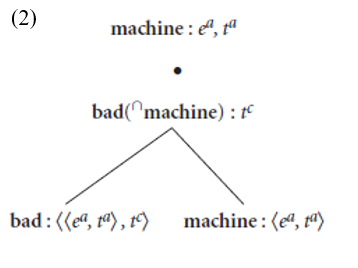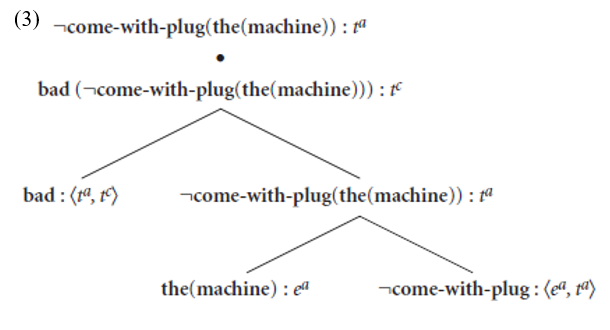


 Grammar
Grammar
 Tenses
Tenses
 Present
Present
 Past
Past
 Future
Future
 Parts Of Speech
Parts Of Speech
 Nouns
Nouns
 Verbs
Verbs
 Adverbs
Adverbs
 Adjectives
Adjectives
 Pronouns
Pronouns
 Pre Position
Pre Position
 Preposition by function
Preposition by function 
 Preposition by construction
Preposition by construction
 Conjunctions
Conjunctions
 Interjections
Interjections
 Grammar Rules
Grammar Rules
 Linguistics
Linguistics
 Semantics
Semantics
 Pragmatics
Pragmatics
 Reading Comprehension
Reading Comprehension| MODIFIER POSITION IN COMPUTING EXPRESSIVE MEANING - SOME BUMPS IN THE ROAD AND A POSITIVE PREDICTION |
|
|
|
Read More
Date: 2025-04-07
Date: 2024-01-20
Date: 2024-01-12
|
Modifier position in computing expressive meaning - Some bumps in the road and a positive prediction
At least two significant challenges present themselves in directly extending this approach to the phenomena of interest here.
Problems with what is modified As Potts himself observes, there are many uses of expressive adjectives of this sort – in fact, of damn in particular – for which something more must be said. What he proposes to deal with these cases, though, proves to be of limited help with respect to the current goals. A clear problematic case is (1):

Given (2) in Potts 2005: Some theoretical machinery and damn expressive adjectives, the predicted interpretation here would be one in which damn machine expresses generalized disapproval of machines as a kind:

This isn’t the desired result, though. One can very naturally talk about a damn machine without having the sentiment that machines are bad.
What Potts proposes to deal with this is that damn in these instances receives a clause-modifying adverbial interpretation, and actually gives rise to a semantic representation like (3):

Importantly, this proposal has some firmempirical grounding – various adjectives can, under particular and somewhat mysterious circumstances, receive “adverbial” readings. The most familiar such case may be The occasional sailor walked by (Stump 1981; Larson 1999; Zimmerman 2000), in which the contribution of occasional is paraphrasable with an adverb as Occasionally, a sailor walked by.
However, the predicted interpretation for this sentence still raises some difficulties. The expressive meaning now assigned to the sentence is one that might otherwise be conveyed by uttering Damn. The machine didn’t come with an electric plug. Certainly, this is an improvement.
Problems with other modifiers If either version of this approach were simply applied as-is to most of the adjectives and adverbs of interest here, the wrong interpretation would result. Neither of the predicted interpretations expressed in (4a) and (4b) properly characterize the contribution of the adjective:

The situation is similar with respect to adverbs, though it is not entirely clear what an “adverbial reading” of an adverb would be

Positive prediction In light of these problems, why go down this road? It is of course possible that the behavior of inherently expressive modifiers such as damn is in some essential way unrelated to how garden-variety modifiers can be interpreted nonrestrictively. But despite the obstacles to connecting these phenomena directly, drawing such a connection does make a surprising and desirable prediction.
It is part of the lexical semantics of damn and fucking that they can receive expressive interpretations only – they have no meaning apart from this, and there is no way to interpret them as contributing ordinary descriptive meaning. If what is banned from post-head positions is exactly this kind of meaning, then it should be the case that damn, having no non-expressive meaning to contribute, should be unable to occur in such positions at all. This is in fact the case:
|
|
|
|
التوتر والسرطان.. علماء يحذرون من "صلة خطيرة"
|
|
|
|
|
|
|
مرآة السيارة: مدى دقة عكسها للصورة الصحيحة
|
|
|
|
|
|
|
نحو شراكة وطنية متكاملة.. الأمين العام للعتبة الحسينية يبحث مع وكيل وزارة الخارجية آفاق التعاون المؤسسي
|
|
|